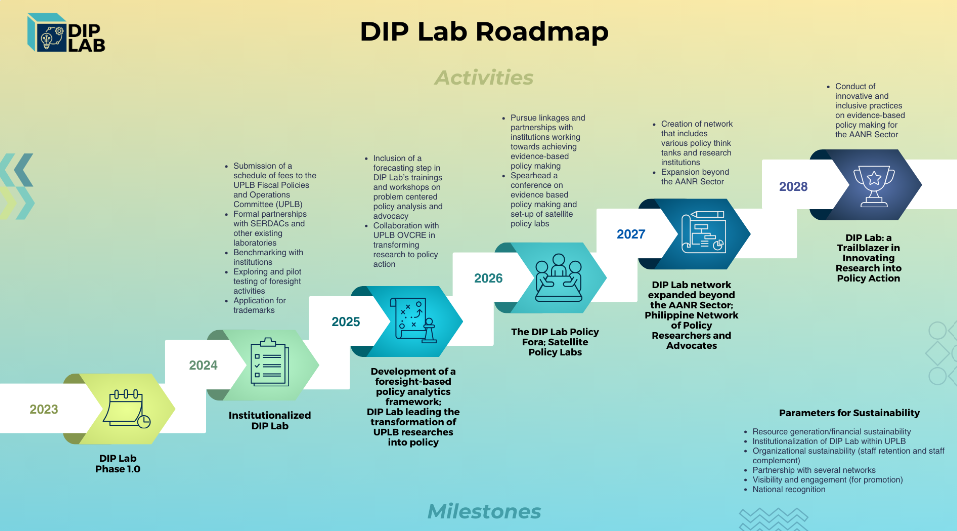The Development Innovations Policy Lab (DIP Lab), an initiative funded by the Philippine Council for Agriculture, Aquatic and Natural Resources Research and Development of the Department of Science and Technology (DOST-PCAARRD), is poised to begin Phase 2 of its implementation.
Established in 2022, DIP Lab aims to bridge the gap between research and public policymaking. It is part of DOST-PCAARRD’s PoliSiyensya Innovation Ecosystem, a network of research and policy laboratories dedicated to shaping socio-economic policy analysis and advocacy for the agriculture, aquatic, and natural resources (AANR) sector in the Philippines.
The DIP Lab’s initial phase has made substantial contributions. It hosted various capacity-building activities across Luzon, Visayas, and Mindanao; conducted policy hackathons with diverse stakeholders; and developed a website and data portal featuring over 600 policy documents related to the AANR sector. Following these accomplishments, a second phase of the project was approved.
On July 9, 2024, the Socio-Economics Research Division (SERD) held an inception meeting for two new projects under DIP Lab:
- DIP Lab 2.0, under the leadership of Dr. Maria Luz Malabayabas of the College of Public Affairs and Development (CPAf), University of the Philippines Los Baños (UPLB) aims to institutionalize the DIP Lab and create a sustainability plan in line with its five-year roadmap. This initiative seeks to enhance and diversify capacity-building efforts through mentorship activities on policy analysis and advocacy. DIP Lab 2.0 will support DOST-PCAARRD-funded projects by packaging policy-relevant information and generating materials to increase engagement and discourse on policy.
- The DIP Lab Benchmarking project, led by Ms. Karen S. Janiya, also of CPAf-UPLB, aims to improve DIP Lab’s processes, methods, and overall operations by examining similar laboratories in the ASEAN region. It seeks to adopt best practices and methodologies from institutions like the Thailand Policy Lab to enhance DIP Lab’s effectiveness and efficiency.
These two new projects are designed to support DIP Lab’s institutionalization and its goal of becoming a leader in enhancing the capabilities and capacities of AANR research producers and consumers, transforming evidence into policy solutions for societal development.
The online inception meeting was organized by SERD, DOST-PCAARRD under the guidance of its Director, Dr. Ernesto O. Brown.
Dr. V. Bruce Tolentino, Ms. Beaulah Maria Dela Pena, and Mr. Rene Sanapo of The Asia Foundation attended the meeting.
During the inception presentation, the DIP Lab Team shared that the laboratory has been successfully institutionalized within UPLB, aligning with its roadmap to become a trailblazer in translating research into policy action. The institutionalization was officially approved on June 25th by the UPLB Executive Committee (Execom) - Management Committee (Mancom).

Moreover, the external evaluators provided valuable insights on developing a structured set of theories and tools for systematic policy reform, utilizing case studies to impact local government policymaking, and employing political thinking in the reform process.
DIP Lab 2.0 started its implementation in June 2024 and is expected to run for two years, while the benchmarking project will commence with a visit to Thailand on July 17-27, 2024.
As DIP Lab embarks on Phase 2 of its implementation, the focus remains on strengthening its role in bridging research and policymaking. Through the initiatives of DIP Lab 2.0 and the Benchmarking Project, DIP Lab aims to institutionalize its operations, enhance capacity-building, and adopt best practices to become a leader in policy innovation for the country’s AANR sector.
With continued support from DOST-PCAARRD and collaborative efforts within the PoliSiyensya Innovation Ecosystem, DIP Lab is well-positioned to contribute to societal development by transforming research evidence into effective policy solutions.
For more details about DIP Lab and its services, please visit its website at https://diplab.uplb.edu.ph/ or its Facebook account at https://www.facebook.com/diplab.uplb.

